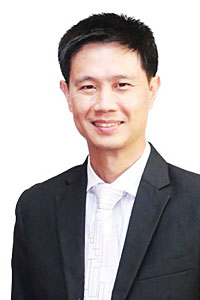
The main photo on the front page of the Bangkok Post yesterday summed up the current political situation in Thailand.In the photo, a group of young men in prison garb and forced crew cuts walked barefoot with their ankles shackled from a jail van to hear a court's decision on whether to extend their detention, as requested by investigators.
Were they really criminals? No, they were students and activists who were dealt with in that manner because they have different political views from the ruling generals. Thus, they were treated in the manner of suspected heinous criminals -- many of whom have escaped jail terms or been on the run because their parents are rich or powerful.
The students were charged with violating the National Council for Peace and Order's (NCPO) ban on political gatherings of more than five people, and sedition, after they questioned the transparency of the forthcoming referendum which is plagued with rigid rules on campaigning and severe penalties.

Nopporn Wong-Anan is deputy editor, Bangkok Post.
The photo has resonated among human rights defenders and international rights bodies as well as some figures in the ruling regime.
Even for tough-talking Gen Prawit Wongsuwon, the deputy prime minister for national security, shackling student activists while taking them to a court hearing was "inappropriate".
The "Big Brother" of the military regime said he appreciated that corrections officials were following the rules when taking the detainees to court, but they could have been more lenient with the students.
"I am not blaming anyone as they were following their guidelines, but I feel they could have adapted some of the rules to suit their status as students," he told reporters yesterday, a day after the Military Court ruled to free all 13 students and activists, rejecting a police request to extend their detention.
The ruling on Tuesday came amid mounting pressure from local and international rights bodies calling for the release of the detainees.
The 13 activists were arrested on June 23 in Samut Prakan province while distributing leaflets on the draft charter referendum, one day before the 84th anniversary of the 1932 revolution that changed Siam from an absolute monarchy to a constitutional one.
Six of them were granted bail while the other seven did not request bail in what they said was an act of civil disobedience.
Some may argue that these students deserved to be jailed because they must have been aware of all the laws before they gave out the leaflets. But for legal activists and lecturers such as Ekachai Chainuwat of Siam University, a referendum is a direct exercise of the people's power.
"If the referendum regulations are too rigid, then it can't be called a referendum as the rules violate the people's rights," he said.
It is less than a month before the Aug 7 referendum, and the general public knows little about the substance of the country's 20th constitution as debates are restricted and confined to small circles.
Hundreds of thousands of "teachers" deployed by the authorities to "educate" people nationwide do nothing more than saying "voting is a duty of a citizen". Even the United Nations has voiced its concern.
UN Deputy Secretary-General Jan Eliasson said he was concerned about the recent reports of restrictions on freedoms of expression and assembly in Thailand ahead of the referendum.
During his meeting with Vice-Minister for Foreign Affairs of Thailand, Virasakdi Futrakul, in New York on June 29, Mr Eliasson stated that respect for human rights and the rule of law are important elements for sustainable development and emphasised the need for open and inclusive dialogue to promote democracy and support national reconciliation.
But the request fell on deaf ears among the ruling generals. Thus, a group of scholars and activists yesterday filed an urgent motion with the Supreme Administrative Court to annul the Election Commission's (EC) announcement on regulations regarding expression of opinions about the referendum.
The petition also asked the Supreme Administrative Court to ban the EC's commercials, saying they polling body's views are lopsided.
But Gen Prawit strongly believes politicians are behind all of this. He insisted the dissenting views against the draft charter come mainly from politicians who have lost their power and urged students to campaign only on campus.
"Be patient. After the referendum, we will be proceeding along the road map," Gen Prawit told the students.
But I am sure there will be more students and activists who want to campaign for a free and fair referendum and they will be arrested again.
During the Cold War, being a communist was a criminal act in Thailand. But in the 21st century, holding dissenting views should not be a crime.
